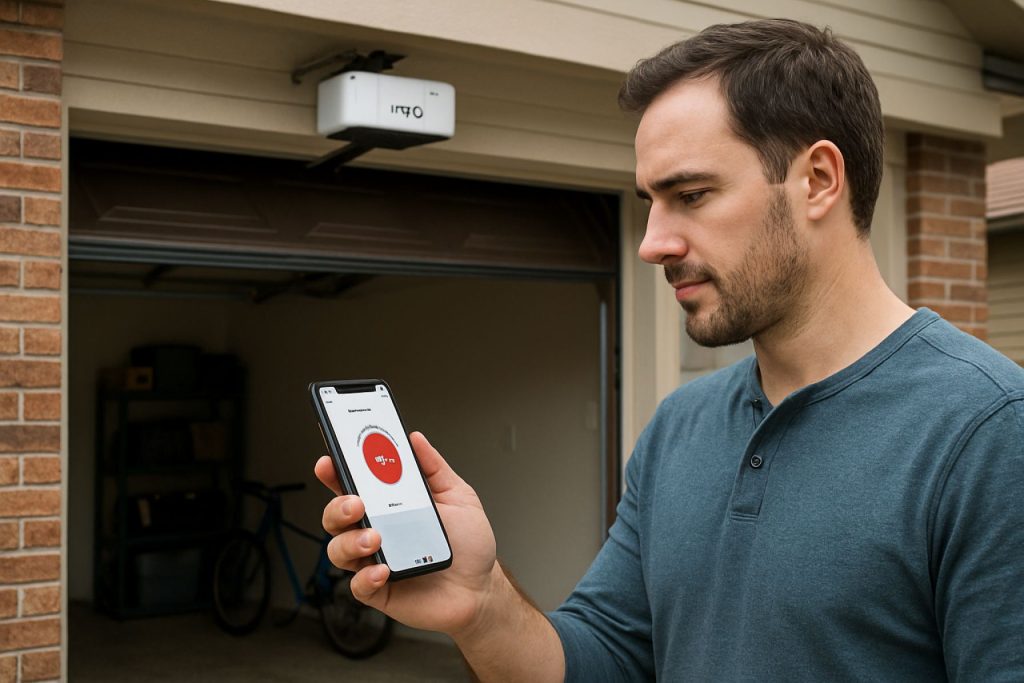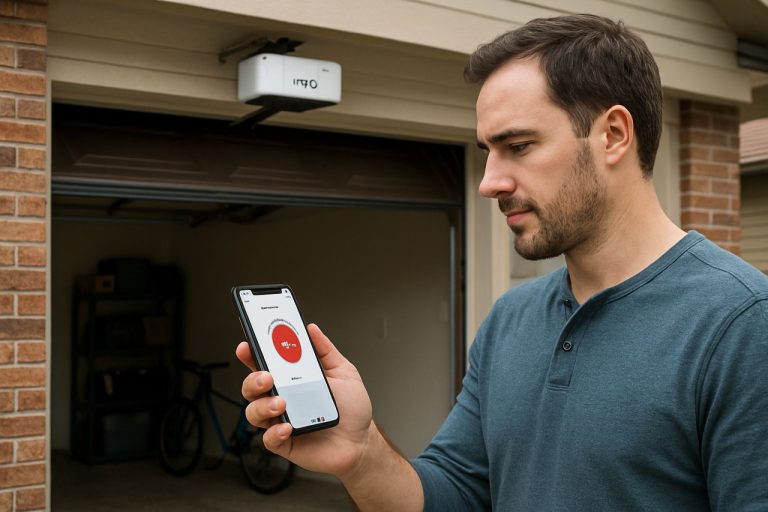
MyQ Smart Garage Door Technology: Transforming Everyday Security and Convenience. Discover How MyQ Is Shaping the Connected Home Experience for Millions. (2025)
- Introduction to MyQ Smart Garage Door Technology
- Core Features and Capabilities of MyQ Systems
- Integration with Smart Home Ecosystems
- Security Protocols and Privacy Safeguards
- User Experience: Setup, App Interface, and Remote Access
- Compatibility with Garage Door Openers and Vehicles
- Market Growth and Adoption Trends (Estimated 15–20% Annual Increase, Source: chamberlain.com)
- Case Studies: Real-World Applications and User Feedback
- Challenges, Limitations, and Future Innovations
- Outlook: The Next Decade of Smart Garage Technology
- Sources & References
Introduction to MyQ Smart Garage Door Technology
MyQ Smart Garage Door Technology, developed by Chamberlain Group, represents a significant advancement in the integration of smart home systems with traditional garage door openers. As of 2025, MyQ technology enables homeowners to monitor, control, and automate their garage doors remotely using smartphones, tablets, or voice assistants. This system leverages Wi-Fi connectivity and cloud-based services to provide real-time notifications, scheduling, and secure access management, reflecting the broader trend toward connected home environments.
Chamberlain Group, a leading manufacturer of access control solutions, has positioned MyQ as a central component in the smart home ecosystem. The technology is compatible with a wide range of garage door openers and integrates with major smart home platforms, including Amazon Alexa, Google Assistant, and Apple HomeKit. This interoperability allows users to incorporate garage access into broader home automation routines, such as geofencing-based opening or closing, and integration with security cameras and lighting systems.
In recent years, MyQ has expanded its capabilities through partnerships with major delivery services. For example, the collaboration with Amazon Key allows for secure in-garage package deliveries, reducing the risk of theft and weather damage. This feature has seen increased adoption, particularly as e-commerce continues to grow and consumers seek safer delivery options. According to Chamberlain Group, millions of households in North America now use MyQ-enabled devices, and the company continues to invest in expanding compatibility and security features.
Security and privacy remain central concerns for users of smart garage technology. MyQ addresses these through encrypted communications, multi-factor authentication, and regular firmware updates. The system also provides detailed activity logs, allowing homeowners to track access events and receive alerts for unusual activity. These features align with industry best practices for IoT device security, as outlined by organizations such as the National Institute of Standards and Technology (NIST).
Looking ahead, the outlook for MyQ Smart Garage Door Technology is closely tied to the continued growth of the smart home market and advancements in IoT security standards. Chamberlain Group is expected to further enhance MyQ’s integration with emerging technologies, such as electric vehicle charging and advanced home energy management systems. As consumer demand for convenience, security, and automation increases, MyQ is poised to remain a key player in the evolution of connected home access solutions.
Core Features and Capabilities of MyQ Systems
MyQ Smart Garage Door Technology, developed by Chamberlain Group, is a leading solution in the connected home ecosystem, offering advanced control and monitoring of garage access. As of 2025, MyQ systems are characterized by a suite of core features designed to enhance security, convenience, and integration with broader smart home platforms.
- Remote Access and Control: MyQ enables users to open, close, and monitor their garage doors remotely via a dedicated mobile application. This functionality is supported by secure cloud connectivity, allowing real-time status updates and control from virtually anywhere. The system also provides customizable notifications, alerting users to door activity or if the garage is left open.
- Integration with Smart Home Ecosystems: MyQ is compatible with major smart home platforms, including Amazon Alexa, Google Assistant, and Apple HomeKit, facilitating seamless voice control and automation routines. This interoperability is a key driver of MyQ’s adoption, as it allows users to incorporate garage access into broader home automation scenarios, such as geofencing or scheduled routines.
- Enhanced Security Features: Security remains a central focus for MyQ. The system employs encrypted communications and two-factor authentication to protect user data and prevent unauthorized access. In 2025, MyQ continues to expand its security capabilities, including integration with video monitoring solutions and real-time activity logs, providing users with comprehensive oversight of garage access events.
- Package Delivery Integration: MyQ’s partnership with major delivery services, such as Amazon Key, enables secure in-garage delivery of packages. This feature addresses the growing concern of package theft and is expected to see increased adoption as e-commerce volumes continue to rise.
- Multi-User and Guest Access: The MyQ platform supports multiple user profiles and temporary guest access, allowing homeowners to grant and manage permissions for family members, service providers, or visitors. This flexibility is particularly valuable for households with varying access needs.
- Scalability and Compatibility: MyQ technology is designed to be compatible with a wide range of garage door openers, both new and existing models, through retrofit modules and integrated solutions. This broad compatibility ensures accessibility for a diverse user base and supports ongoing market expansion.
Looking ahead, MyQ is expected to further enhance its capabilities through deeper integration with emerging smart home standards and expanded partnerships with security and logistics providers. The focus on user-centric features, robust security, and interoperability positions MyQ as a foundational technology in the evolving landscape of connected home access solutions. For more information, visit the Chamberlain Group.
Integration with Smart Home Ecosystems
As of 2025, MyQ Smart Garage Door Technology, developed by Chamberlain Group, continues to expand its integration capabilities within the broader smart home ecosystem. MyQ enables users to control and monitor their garage doors remotely via smartphone applications, and its compatibility with leading smart home platforms has become a central focus for both consumer convenience and security.
MyQ’s integration with major smart home ecosystems such as Apple HomeKit, Google Assistant, and Amazon Alexa has been a significant driver of its adoption. Through these integrations, users can incorporate garage access into routines, voice commands, and automation scenarios. For example, MyQ’s compatibility with Apple HomeKit allows users to control their garage doors using Siri and to include garage access in HomeKit scenes and automations. Similarly, MyQ’s partnership with Amazon enables in-garage delivery for Amazon Prime members, enhancing package security and convenience (Chamberlain Group).
In 2025, MyQ continues to expand its ecosystem partnerships. The technology is now compatible with a growing range of third-party devices and platforms, including select smart locks, security cameras, and home automation hubs. This interoperability is facilitated through APIs and cloud-to-cloud integrations, allowing developers and device manufacturers to build new experiences around secure garage access. For instance, integration with smart security cameras enables users to receive real-time video feeds when the garage door is operated, further enhancing home security.
Data privacy and security remain top priorities as MyQ’s integrations deepen. Chamberlain Group has implemented robust encryption protocols and multi-factor authentication to protect user data and prevent unauthorized access. The company also collaborates with industry groups to ensure compliance with evolving smart home security standards (Consumer Technology Association).
Looking ahead, the outlook for MyQ’s integration with smart home ecosystems is strong. The proliferation of connected devices and the increasing demand for seamless, automated home experiences are expected to drive further innovation. Chamberlain Group has signaled ongoing investment in open standards and interoperability, positioning MyQ as a foundational component in the connected home landscape. As smart home platforms evolve, MyQ’s flexible integration model is likely to support new use cases, such as energy management and advanced home security scenarios, over the next several years.
Security Protocols and Privacy Safeguards
As smart home adoption accelerates in 2025, security protocols and privacy safeguards for connected devices like the MyQ Smart Garage Door Technology remain a central concern. MyQ, developed by Chamberlain Group, integrates Wi-Fi connectivity and cloud-based controls to allow users to monitor and operate their garage doors remotely. This connectivity, while convenient, introduces potential vulnerabilities that require robust security measures.
Chamberlain Group has implemented several layers of security to protect MyQ users. Communication between the MyQ device, mobile applications, and cloud servers is encrypted using industry-standard Transport Layer Security (TLS), which helps prevent interception or tampering of data in transit. Device authentication protocols ensure that only authorized users and devices can access or control the garage door system. In 2024 and 2025, Chamberlain Group has continued to update its firmware and mobile applications to address emerging threats and patch vulnerabilities, reflecting a commitment to ongoing security improvement.
User privacy is also a priority. MyQ’s privacy policy outlines the collection of data such as device identifiers, usage logs, and location information, which are used to enhance functionality and user experience. However, Chamberlain Group states that it does not sell personal information to third parties and complies with relevant privacy regulations, including the California Consumer Privacy Act (CCPA) and the General Data Protection Regulation (GDPR) for users in applicable regions. Users are provided with controls to manage their data sharing preferences and can request deletion of their personal information.
In 2025, integration with third-party platforms—such as Amazon Key for in-garage deliveries—has prompted additional scrutiny of data sharing and access controls. Chamberlain Group has established partnership agreements that require third parties to adhere to strict security and privacy standards. Multi-factor authentication (MFA) is increasingly encouraged for user accounts, and access logs are available for users to monitor activity.
- End-to-end encryption for device communication
- Regular security audits and firmware updates
- Compliance with major privacy regulations (CCPA, GDPR)
- User controls for data management and sharing
- Multi-factor authentication and access logging
Looking ahead, the outlook for MyQ’s security and privacy protocols is shaped by the broader evolution of smart home standards. Chamberlain Group is a participant in industry initiatives to improve interoperability and security, such as the Connectivity Standards Alliance’s Matter protocol, which is expected to further enhance device authentication and privacy protections in the coming years (Chamberlain Group).
User Experience: Setup, App Interface, and Remote Access
In 2025, the user experience of MyQ Smart Garage Door Technology continues to be a focal point for both Chamberlain Group, the manufacturer, and its growing user base. The setup process for MyQ devices has been streamlined in recent years, with most users able to complete installation in under 30 minutes using the included step-by-step instructions and video tutorials accessible via the MyQ app. The system is designed to be compatible with a wide range of garage door openers manufactured after 1993, provided they feature standard safety sensors. This broad compatibility has contributed to MyQ’s widespread adoption in North America and select international markets.
The MyQ app interface, available for both iOS and Android platforms, has undergone iterative updates to enhance usability and accessibility. In 2025, the app features a clean dashboard that allows users to monitor the status of their garage door in real time, receive activity notifications, and access a log of recent events. The app also supports scheduling, enabling users to automate door operations based on time of day or recurring routines. Integration with major smart home ecosystems, such as Apple HomeKit, Google Assistant, and Amazon Alexa, remains a key feature, allowing for voice control and interoperability with other connected devices. These integrations are made possible through partnerships and compliance with the respective platforms’ security and privacy standards.
Remote access is a cornerstone of the MyQ experience. Users can open, close, or check the status of their garage door from virtually anywhere with an internet connection. This functionality is secured through encrypted communications and multi-factor authentication options, reflecting Chamberlain Group’s ongoing commitment to user safety and data privacy. In 2025, MyQ continues to expand its remote access capabilities, including support for guest access, which allows homeowners to grant temporary or recurring entry permissions to family members, service providers, or delivery personnel. This is particularly relevant as MyQ maintains its partnership with Amazon Key, enabling secure in-garage deliveries for eligible Amazon Prime members.
Looking ahead, Chamberlain Group is expected to further refine the MyQ user experience by leveraging user feedback and advances in mobile technology. Anticipated developments include deeper integration with emerging smart home standards and expanded automation features. As the smart home market matures, MyQ’s focus on intuitive setup, robust app functionality, and secure remote access positions it as a leading solution in connected garage technology. For more information, visit the official site of Chamberlain Group.
Compatibility with Garage Door Openers and Vehicles
MyQ Smart Garage Door Technology, developed by Chamberlain Group, has established itself as a leading platform for remote garage access and automation. As of 2025, MyQ’s compatibility landscape continues to expand, reflecting both consumer demand for interoperability and the rapid evolution of smart home ecosystems.
MyQ is natively compatible with most garage door openers manufactured after 1993 that use standard safety sensors. Chamberlain Group, which also owns the LiftMaster and Craftsman brands, ensures that its own openers are fully MyQ-ready, while also providing retrofit solutions—such as the MyQ Smart Garage Control—for older or non-native systems. This device connects to the existing opener and Wi-Fi network, enabling MyQ functionality without requiring a full hardware replacement. According to Chamberlain Group, the MyQ app supports hundreds of opener models, and the company maintains an updated compatibility tool to guide consumers.
Vehicle integration is a significant area of growth. MyQ has partnered with major automakers to embed garage control directly into vehicle infotainment systems. For example, select models from General Motors, Ford, and Honda offer MyQ integration, allowing drivers to monitor and operate their garage doors from the dashboard. This is typically achieved through in-vehicle apps or connected services platforms, leveraging the car’s cellular or Wi-Fi connectivity. The trend is expected to accelerate as more vehicles become equipped with advanced telematics and as automakers seek to differentiate their connected services offerings.
In addition to direct vehicle integration, MyQ maintains compatibility with leading smart home platforms, including Apple HomeKit, Google Assistant, and Amazon Alexa. This allows users to control their garage doors via voice commands or automation routines, further broadening the ecosystem. However, some integrations—such as with Amazon Alexa—may require additional hardware or subscription services, reflecting ongoing shifts in the smart home business model.
Looking ahead, Chamberlain Group is investing in expanded interoperability, including support for emerging standards like Matter, which aims to unify smart home device communication. As Matter adoption grows, MyQ’s compatibility with a wider array of devices and platforms is anticipated to improve, reducing fragmentation and enhancing user experience. The company’s ongoing collaborations with automakers and smart home leaders position MyQ to remain at the forefront of garage access technology through 2025 and beyond.
Market Growth and Adoption Trends (Estimated 15–20% Annual Increase, Source: chamberlain.com)
The MyQ Smart Garage Door Technology, developed by Chamberlain Group, continues to experience robust market growth and increasing adoption rates in 2025. According to data provided by Chamberlain Group, the adoption of MyQ-enabled devices is estimated to be rising at an annual rate of 15–20%. This growth is driven by several converging factors, including the expanding smart home ecosystem, heightened consumer demand for convenience and security, and the integration of MyQ with leading smart home platforms.
Chamberlain Group, a leading manufacturer of access control solutions, has positioned MyQ as a central component in the connected home. The technology allows users to monitor, control, and automate their garage doors remotely via smartphone applications, and it is compatible with major platforms such as Apple HomeKit, Google Assistant, and Amazon Alexa. This interoperability has been a significant catalyst for adoption, as consumers increasingly seek seamless integration across their smart devices.
In 2025, the MyQ ecosystem has expanded beyond residential garages to include commercial and multi-family applications, further broadening its addressable market. The company reports that partnerships with major e-commerce and delivery services, such as Amazon Key, have also contributed to the technology’s appeal by enabling secure in-garage package delivery. This feature addresses growing concerns about package theft and last-mile delivery security, which remain top priorities for consumers and businesses alike.
Data from Chamberlain Group indicates that the installed base of MyQ devices is expected to surpass several million units globally by the end of 2025. The company’s ongoing investment in cloud infrastructure and cybersecurity is aimed at supporting this rapid expansion while maintaining user trust and system reliability.
Looking ahead, the outlook for MyQ Smart Garage Door Technology remains positive. The anticipated annual growth rate of 15–20% is expected to persist over the next few years, fueled by continued innovation, expanding partnerships, and the proliferation of smart home adoption worldwide. As the Internet of Things (IoT) landscape matures, MyQ is well-positioned to remain a leading solution in the smart access control segment, with Chamberlain Group actively exploring new features and integrations to meet evolving consumer needs.
Case Studies: Real-World Applications and User Feedback
The adoption of MyQ Smart Garage Door Technology, developed by Chamberlain Group, has accelerated in both residential and commercial settings through 2025. MyQ enables users to remotely monitor, open, and close their garage doors via smartphone applications, integrating with major smart home ecosystems and delivery services. Real-world case studies and user feedback highlight the technology’s impact on convenience, security, and operational efficiency.
In residential contexts, MyQ’s integration with platforms such as Amazon Key has enabled secure in-garage package deliveries, reducing theft and weather-related damage. According to data from Chamberlain Group, millions of households in North America have adopted MyQ, with user surveys indicating high satisfaction rates for features like real-time notifications and remote access. Homeowners report increased peace of mind, especially when traveling, as they can verify door status and grant access to trusted individuals remotely.
Commercial applications are also expanding. Property managers and small business owners utilize MyQ to streamline access control for multiple users and locations. For example, logistics companies have piloted MyQ-enabled access for delivery personnel, reducing wait times and improving security. Feedback from these pilots, as reported by Chamberlain Group, suggests notable reductions in unauthorized access incidents and operational delays.
User feedback collected through app store reviews and direct surveys points to several recurring themes. Positive responses emphasize the reliability of remote operation, the value of activity logs, and the ease of integration with other smart home devices. However, some users have expressed concerns about subscription fees for advanced features and occasional connectivity issues, particularly in areas with weak Wi-Fi signals.
Looking ahead, Chamberlain Group has announced ongoing partnerships with leading smart home and automotive manufacturers to further expand MyQ’s compatibility and feature set. The company is also investing in enhanced cybersecurity measures and AI-driven automation, aiming to address user concerns and anticipate future needs. As smart home adoption continues to rise, MyQ’s real-world applications are expected to diversify, with new case studies likely to emerge in multi-family housing, commercial fleets, and urban delivery networks.
Overall, the case studies and user feedback from 2025 underscore MyQ’s role as a pivotal technology in the evolution of secure, connected access solutions, with a strong outlook for continued growth and innovation in the coming years.
Challenges, Limitations, and Future Innovations
MyQ Smart Garage Door Technology, developed by Chamberlain Group, has become a leading solution for remote garage access and automation. However, as the technology matures in 2025, several challenges and limitations persist, shaping the trajectory of future innovations.
One of the primary challenges is interoperability. While MyQ supports integration with major smart home platforms such as Apple HomeKit, Google Assistant, and Amazon Alexa, compatibility is not universal across all devices and ecosystems. Users often encounter limitations when attempting to connect MyQ with certain third-party systems or older garage door openers, which can hinder seamless smart home experiences. Chamberlain Group continues to expand partnerships and update firmware, but full interoperability remains a work in progress.
Security and privacy are also critical concerns. As MyQ devices connect to home Wi-Fi networks and cloud services, they become potential targets for cyber threats. In recent years, the company has implemented enhanced encryption protocols and multi-factor authentication to mitigate risks. Nevertheless, the evolving landscape of cybersecurity means that ongoing vigilance and updates are necessary to protect user data and prevent unauthorized access. The importance of robust security measures is underscored by the increasing adoption of smart home devices globally, with millions of MyQ units in operation as of 2025.
Another limitation is the reliance on stable internet connectivity. MyQ’s core features, such as remote monitoring and control, depend on cloud-based infrastructure. Service outages or connectivity issues can temporarily disable remote access, causing inconvenience for users. Chamberlain Group is exploring solutions such as local control options and improved offline functionality to address these concerns in future product iterations.
Looking ahead, several innovations are anticipated. The integration of artificial intelligence and machine learning could enable predictive maintenance alerts, adaptive automation routines, and enhanced security features. Additionally, the expansion of MyQ’s ecosystem to include more comprehensive home access solutions—such as smart locks, package delivery integration, and vehicle-to-home communication—reflects the company’s vision for a connected, secure, and convenient user experience. Chamberlain Group’s ongoing investment in research and development, as well as its collaborations with automotive and logistics partners, signal a commitment to driving the evolution of smart garage technology in the coming years (Chamberlain Group).
Outlook: The Next Decade of Smart Garage Technology
As of 2025, MyQ Smart Garage Door Technology, developed by Chamberlain Group, stands as a leading solution in the connected home ecosystem, enabling users to monitor, control, and automate garage access remotely. The technology leverages Wi-Fi connectivity, cloud-based services, and integration with major smart home platforms, including Amazon Alexa, Google Assistant, and Apple HomeKit. This interoperability has positioned MyQ as a central player in the ongoing evolution of smart home infrastructure.
Recent years have seen MyQ expand its capabilities beyond simple remote operation. In 2024, Chamberlain Group announced enhanced partnerships with e-commerce and delivery services, notably Amazon Key, allowing for secure in-garage package deliveries. This feature addresses the growing concern over package theft and is expected to see broader adoption as e-commerce volumes continue to rise. According to Chamberlain Group, millions of households now use MyQ-enabled devices, reflecting robust consumer demand for secure, automated access solutions.
Looking ahead to the next few years, several trends are likely to shape the trajectory of MyQ and similar technologies:
- Deeper Integration with Smart Home Ecosystems: MyQ is expected to further integrate with leading smart home platforms, enabling more seamless automation scenarios. For example, garage doors could automatically open for recognized vehicles or close when security systems are armed, enhancing both convenience and safety.
- Expansion of Delivery and Access Services: As last-mile delivery continues to evolve, MyQ’s role in secure, unattended access will likely expand. Partnerships with logistics providers and retailers may introduce new services, such as grocery or prescription deliveries directly to the garage, leveraging MyQ’s secure access controls.
- Enhanced Security and Privacy Features: With increased connectivity comes heightened focus on cybersecurity and user privacy. Chamberlain Group has indicated ongoing investment in encryption, authentication, and user control features to address these concerns and comply with emerging standards from organizations such as the National Institute of Standards and Technology.
- Data-Driven Predictive Maintenance: Leveraging cloud analytics, MyQ may offer predictive maintenance alerts, notifying homeowners of potential mechanical issues before they result in failures, thus reducing downtime and repair costs.
By 2030, MyQ and similar technologies are poised to become standard features in new homes, driven by consumer demand for convenience, security, and integration. The ongoing collaboration between device manufacturers, standards bodies, and service providers will be critical in shaping a secure, interoperable, and user-friendly smart garage ecosystem.



